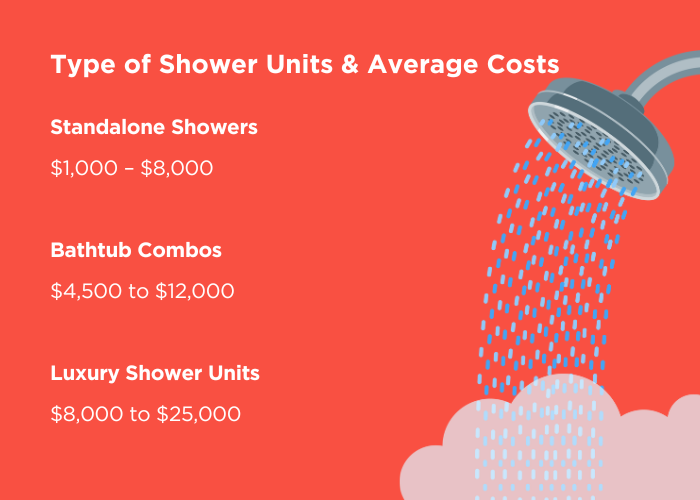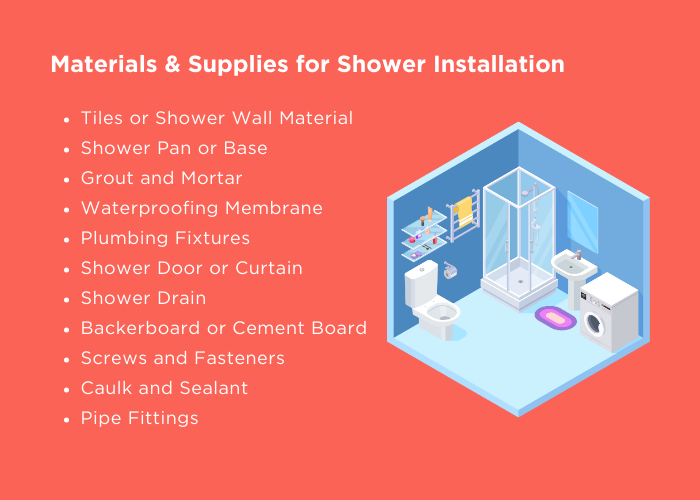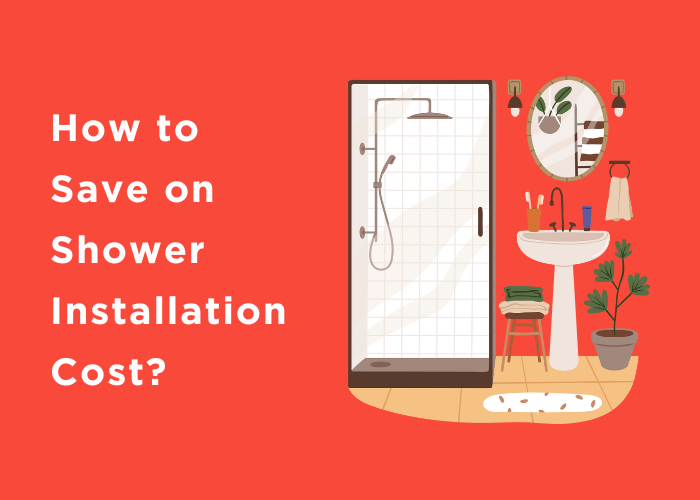A new shower can completely upgrade the look and feel of your bathroom. A well-designed and functional shower adds comfort and increases property value for homeowners.
So, whether you’re remodeling your bathroom or replacing your old shower, you must be mindful of the cost and budget.
The expense associated with installing a shower depends on various factors such as sizes, shapes, and materials. Also, cost-effective installations maximize returns on investment.
The national average cost of shower replacement range for a fully installed shower, including the plumbing, walls, and base, is between $7,000 and $12,000.
We’re here to provide a comprehensive overview of the shower installation cost, including additional expenses and saving options for shower installation.
So, how much does it cost to replace a shower?
The cost to install a shower varies based on different things. While many factors are involved in pricing a shower installation, the prices may be better than you imagine.
Bigger showers usually come with a higher price. A regular walk-in shower is about 32-by-32 inches. If you opt for a pre-made shower without a door, the installation and materials cost around $1,150, making the cost per square foot approximately $210.
So, the size of your shower can significantly impact how much you'll end up spending. Choosing the right dimensions and features is key to managing your budget for installing a shower.

Shower installation costs vary based on the type of shower chosen, influencing aesthetics and expenses. Here are different shower types you can consider:
Standalone showers offer versatility and various design options. These showers are separate units, not combined with a bathtub, providing flexibility in layout and style. Depending on the chosen design, installation costs may vary, with plumbing considerations affecting the expense. Depending on materials and complexity, homeowners can expect to invest between $1,000 and $8,000 to install standalone showers.
Bathtub combos combine the functionality of a shower and a bathtub in a single unit, optimizing space and catering to diverse preferences. These installations typically cost between $4,500 and $12,000, including the bathtub and shower features. The expense is influenced by the materials used, the complexity of the installation, and any additional features integrated into the unit.
Luxury shower units go beyond standard functionality, offering advanced features and upscale design elements. These units can include features like multiple showerheads, digital controls, and high-end materials. Luxury shower installations are more intricate, leading to a higher cost of $8,000 to $25,000. The price is driven by premium materials, sophisticated designs, and specialized plumbing requirements associated with luxurious shower setups.
Here’s the cost difference by shower type:
| Shower type | Average installation cost |
| Standalone Showers | $1,000 – $8,000 |
| Bathtub Combos | $4,500 to $12,000 |
| Luxury Shower Units | $8,000 to $25,000 |
Professional installation fees for shower installation include skilled labor, ensuring a precise and efficient process. While fees contribute to the overall cost, they come with benefits such as expertise, quality workmanship, and compliance with safety standards. Professional installers have complete know-how, minimizing the risk of errors.
The most common labor costs in shower installation include:
Experienced professionals demand higher hourly rates, with plumbers and contractors charging between $50 to $120 per hour, depending on their expertise and skill levels.
The cost involves removing existing fixtures and preparing the installation area, with expenses contingent on the complexity of the demolition process.
Skilled plumbers handle water supply lines, drainage, and connections to existing plumbing, with varying costs based on the expertise required.
Labor costs cover the installation of tiles or flooring, with expenses determined by the type of materials used and the intricacy of the design.
Workers apply waterproof membranes or materials to prevent water damage, with labor costs influenced by the size and complexity of the shower area.
Electricians install lighting fixtures or other electrical components, with separate labor rates applied for their specialized expertise.
Labor rates exhibit regional variations based on regional cost of living, with urban areas generally demanding higher prices than rural locations.
Highly skilled contractors demand premium rates for their expertise, especially for specialized installations or custom designs requiring advanced professional knowledge.
The above cost factors aren’t the only things to remember when installing a shower. Extra features or customizing can increase the overall cost to replace shower. Upgrading fixtures and tiles or opting for a different design incurs additional expenses.
The installation will differ depending on the type of shower you have chosen. Some showers will sometimes require access to your mains supply, boiler, and electricity supply. Therefore, skilled labor for demolition, plumbing adjustments, and installation contribute to the cost, ensuring a successful and aesthetically pleasing transformation.
Let’s explore the additional expenses for shower replacement cost.

Understanding the quality of materials and supply chain factors is essential when considering materials cost for shower installation. High-quality materials contribute to durability and aesthetic appeal, impacting the longevity of the shower. Additionally, assessing supply chain factors ensures timely availability, preventing project delays.
Here’s an extensive list of installation materials and supply costs associated with shower installation.
The tiles or shower wall material costs $5 to $100 per square foot, depending on the type and quality chosen, with high-end materials for expert installation.
Shower pans range from $120 to $1,500, with the material (acrylic, fiberglass, or tile) and size influencing the cost of this foundational component.
Grout and mortar costs approximately $10 to $50 per bag, depending on the quantity needed and the specific type chosen for the installation. The quality of grout and mortar is non-negotiable, as inferior products can lead to water penetration, compromising structural integrity.
Waterproofing membrane costs vary between $0.50 to $3 per square foot, depending on the brand and type, ensuring protection against water damage in the shower area.
Plumbing fixtures, including showerheads and handles, can range from $20 to $500 each, with the overall cost influenced by brand, design, and functionality. Cheap shower installation with inferior fixtures can lead to leaks, reduced water pressure, and frequent malfunctions.
Durable fixtures, on the other hand, ensure reliable performance, preventing costly water damage and the need for frequent repairs, making quality an essential consideration.
Shower doors range from $100 to $1,500, while curtains are more affordable, costing between $10 and $100, depending on the material, style, and brand chosen.
Shower drain costs vary between $20 and $200, with options such as linear or traditional drains influencing the overall expense of this essential component. High-quality drains, designed for durability, prevent these issues, ensuring the shower's efficiency, while inferior drains risk leaks and drainage issues, potentially causing water damage.
Backerboard or cement board costs around $10 to $20 per sheet, with the size and brand affecting the overall expense of this substrate material for shower walls.
Screws and fasteners typically cost between $5 and $20, depending on the quantity and type needed for securing various components during the shower installation process.
Caulk and sealant costs range from $5 to $15 per tube, with the type of caulk (silicone or acrylic) and brand influencing the overall cost of sealing joints and seams.
The cost of pipe fittings varies widely, ranging from $1 to $50 per fitting, depending on the material, size, and type required for the plumbing connections in the shower installation.
Unforeseen expenses such as plumbing upgrades or structural modifications may emerge during the installation, leading to upgrades or repairs to existing systems and impacting the project cost.
Plumbing complexities and additional renovation costs are unexpected expenses that must be anticipated and analyzed before the shower installation project.
Problems in plumbing upgrades during a shower installation may include re-routing pipes, upgrading water pressure systems, or addressing corroded pipes.
Structural modifications, such as reinforcing walls or floors to support the new shower features, may be required for safety and functionality, adding expenses.
Moreover, here are some of the other most common unforeseen expenses that may occur during a shower installation project:
Therefore, setting a budget aside for unforeseen expenses during shower installation is important to mitigate financial stress and maintain project continuity. Anticipating unexpected costs ensures preparedness, preventing disruptions to the timeline and quality of work.
It’s now getting clearer as to why shower installation costs and labor costs vary widely. Remodeling a shower and upgrading existing fixtures must be done cost-effectively.
Challenging as it seems, the truth is that you can either DIY or hire a professional to install the shower.

While the temptation for self-installation savings with a DIY approach may be strong, meddling with your home's plumbing is not recommended unless you have the relevant expertise.
Obtaining a permit for such tasks may prove challenging. Moreover, fixing damage resulting from an improper installation can further increase the cost of hiring a professional—especially when dealing with considerable water damage.
Most importantly, while DIY projects may save money initially, the precision and efficiency of professional installation will help avoid mistakes and benefit in the long run. Professional installers offer expertise, reducing the risk of errors and ensuring code compliance.
Pros of DIY:
Cons of DIY:
Opting for a DIY installation is cost-effective, as homeowners may avoid labor expenses. However, the potential drawbacks include the need for specialized skills, potential errors, and the risk of costly rework. DIYers must also purchase or rent tools and may face challenges ensuring code compliance, potentially increasing long-term costs.
Pros of Professional Installation:
Cons of Professional Installation:
Meanwhile, the professional installation benefits include expertise, minimizing errors and ensuring adherence to industry standards. While labor costs contribute to the overall expense, professional services for installing showers can efficiently handle complexities, potentially saving money in the long run by preventing costly mistakes and ensuring a durable, high-quality result.
So, considering DIY vs. professional installation costs? Cost is among the most important factors for DIY and professional bathroom remodels.
The average cost for a DIY shower installation can vary widely based on factors like materials, tools, and potential errors. On average, materials might range from $1,000 to $3,000, and additional tool rentals or purchases can contribute a few hundred dollars. However, unforeseen mistakes may increase costs, potentially bringing the total to $4,000 or more.
Professional shower installation typically incurs higher upfront costs due to labor expenses, averaging between $1,500 and $5,000. While this may seem pricier initially, professionals minimize errors, preventing costly rework. In the long run, the durability and quality assurance experts provide can outweigh the initial investment.
Shower installation is not just about swapping old ones for new ones; it’s an investment in your home’s comfort and value. Choosing the right shower installation materials is key to your bathroom remodeling success. There are numerous budget-friendly choices for materials and fixtures available in the market.
Selecting cost-effective materials and fixtures for shower installation without compromising quality is essential for long-term durability and functionality. High-quality materials ensure resistance to water damage, reducing the risk of issues such as mold or structural damage.
Durable and quality fixtures guarantee a reliable and aesthetically pleasing shower, enhancing comfort and property value. Investing in quality upfront prevents frequent repairs or replacements, saving time and money in the long run.
Follow these 5 steps for economical material selection for shower installation:
Look for discounts or sales on quality materials, helping you acquire them at a lower cost. Thoroughly search for promotions, discounts, or seasonal sales on durable materials, enabling you to secure high-quality items at a reduced cost and optimize your budget for a shower installation project.
Explore cost-effective alternatives for materials, such as choosing porcelain tiles instead of natural stone. Evaluate cost-effective alternatives while ensuring budget efficiency without compromising durability or aesthetics.
Buying materials in bulk can often lead to discounts, reducing the project's cost. Procure materials in larger quantities to benefit from bulk discounts, effectively lowering the overall shower installation expense while maintaining material quality.
Focus your budget on essential high-quality items like waterproofing membranes, ensuring longevity and preventing future issues. These membranes create a barrier, preventing moisture infiltration into structural elements. By investing in quality waterproofing, you ensure the durability of your shower, avoiding potential issues like mold growth, deterioration of materials, and costly repairs in the future.
Conduct comprehensive price comparisons across different suppliers, allowing you to identify the most cost-effective deals on the necessary materials for your shower installation, ensuring quality and affordability.
Budgeting for home renovation, particularly shower installation, requires comprehensive planning. Shower installation costs depend on various factors, including materials, labor, and additional features.
Smart budgeting strategies help achieve a successful and cost-effective project requires balancing quality and budget considerations. Opting for high-quality materials ensures durability, preventing future issues and costly repairs.
Although an initial expense, professional shower installation services reduce the risk of errors, leading to the shower's longevity. While additional features can enhance aesthetics and functionality, careful selection is essential to prevent unnecessary expenses.
Moreover, focusing on essentials, researching discounts, and comparing prices across suppliers allow for cost-efficient choices without compromising quality.
A well-informed approach, considering the initial investment and long-term benefits, ensures successful installation.